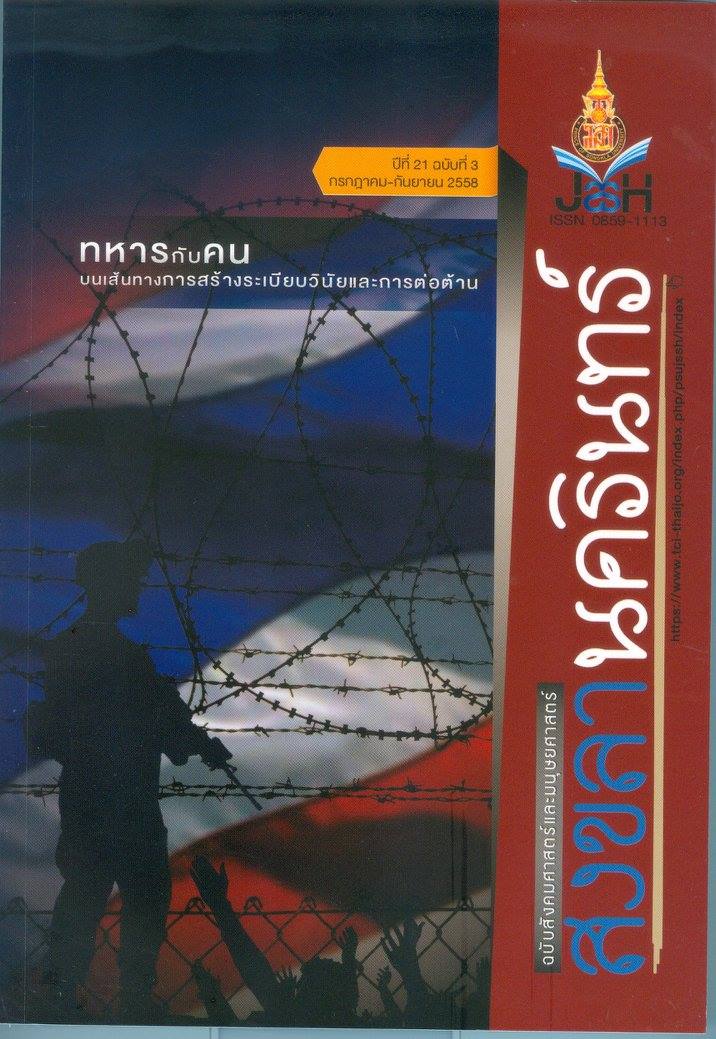<b>การใช้จดหมายเหตุในการวิจัยทางมนุษยศาสตร์ : ประสบการณ์ของครูภาษาตะวันตก</b><br> The Use of Archive in Humanities Research: Experience of a Modern Linguist
คำสำคัญ:
archive, humanities, primary source, researchบทคัดย่อ
In an age in which the humanities at the
international level are awakening from a state of
theoretical fixation, the importance of having access
to primary sources is becoming more apparent. The
use of archival materials enables researchers to give
concrete answers to research questions, which
naturally lends credibility to their research findings.
The author discusses the tripartite relationships
among the following factors: 1) The accumulation
and preservation of data in the form of archival
materials; 2) The systematic management of these
materials that should create public awareness of
cultural heritage and at the same time respond to
scholarly needs; and 3) The utilization by, and the
role of, users, which is the ultimate goal of all archival activities. The author offers analyses of case
studies based on general as well as his own
experiences, both in foreign and Thai contexts, in
order to reaffirm the point that archival materials
can give answers that are denied to other forms of
data. In Thailand, systematic archival enterprises
are only just beginning and need all kinds of support.
Not only the humanities are experiencing an archival
renaissance, but other fields of study, such as the
visual arts, are becoming conscious of the potential
of archival data in enhancing the understanding and
appreciation of the arts. On the negative side, the
neglect or destruction of archival materials can leave
irreparable knowledge gaps, as may be witnessed
from the case of the history of modern Thai theatre
<br><br> Keywords : archive, humanities, primary source,
research
<br><br>
<b> บทคัดย่อ</b><br>ในยุคที่วงวิชาการด้านมนุษยศาสตร์ในระดับ
นานาชาติก�าลังฟื้นตัวจากการหมกมุ่นอยู่กับเรื่องของ
ทฤษฎี ความส�าคัญของการเข้าถึงแหล่งข้อมูลปฐมภูมิ
ก็เห็นประจักษ์ชัดขึ้น การใช้จดหมายเหตุในการวิจัย
ช่วยให้นักวิจัยสามารถตอบโจทย์การวิจัยได้อย่างเป็น
รูปธรรม ซึ่งท�าให้ผลการวิจัยน่าเชื่อถือ ผู้เขียนอภิปราย
ความเชื่อมโยงของ“ไตรภาคี” ของงานจดหมายเหตุ
อันได้แก่ 1) การสะสมและเก็บรักษาข้อมูลในรูปของ
จดหมายเหตุ 2) การจัดการกับจดหมายเหตุอย่างเป็น
ระบบเพื่อสร้างความสนใจในเรื่องของมรดกทาง
วัฒนธรรมให้แก่มหาชนและสนองความต้องการทาง
วิชาการ และ 3) การน�าไปใช้และบทบาทของผู้ใช้
อันเป็นจุดหมายปลายทางของกิจทั้งหลายที่ว่าด้วย
จดหมายเหตุ ทั้งนี้ผู้เขียนวิเคราะห์ตัวอย่างที่เป็น
รูปธรรม ทั้งที่เป็นประสบการณ์ทั่วไปและประสบการณ์
ของตนเองทั้งในและต่างประเทศ เพื่อยืนยันว่า
จดหมายเหตุให้ค�าตอบที่ข้อมูลประเภทอื่นมิอาจจะให้
ได้ ส�าหรับวงวิชาการไทยนั้นกิจการด้านจดหมายเหตุ
เพิ่งจะเริ่มก่อตัวอย่างเป็นระบบและต้องการ
การสนับสนุนในทุกๆ ด้าน ไม่ใช่แต่เฉพาะวงการ
มนุษยศาสตร์เท่านั้นที่การใช้จดหมายเหตุก�าลัง
ตื่นตัว แต่วิทยาการสาขาอื่น เช่น ทัศนศิลป์ ก็ส�านึกใน
ศักยภาพของจดหมายเหตุในการสร้างความเข้าใจ และ
ความชื่นชมที่พึงมีต่องานศิลปะ ในด้านลบ การละเลย
จดหมายเหตุหรือท�าลายหลักฐานประเภทนี้ก่อให้เกิด
ช่องว่างทางความรู้ที่ไม่อาจจะหาสิ่งใดมาทดแทนได้
ดังตัวอย่างของการศึกษาประวัติการละครเวทียุคใหม่
ของไทย
<br><br> คำสำคัญ:การวิจัย, ข้อมูลปฐมภูมิ, จดหมายเหตุ,
มนุษยศาสตร์










